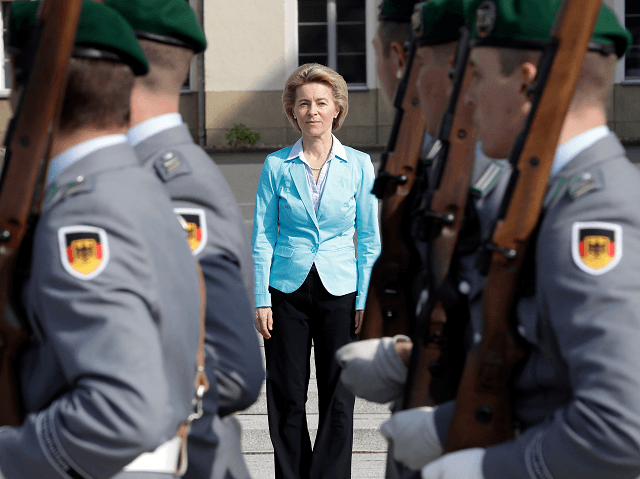BERLIN, Germany: Tackling NATO nations failing to meet their alliance obligations is a key priority for President Trump, his right-hand-man in Europe has revealed in an exclusive interview.
Speaking to Breitbart London during a sit-down at the U.S. residence in Berlin, recently confirmed Ambassador Richard Grenell delivered a frankly worded condemnation of Germany’s contribution to the NATO alliance to which the United States is a significant contributor.
“NATO spending is one thing that the President told me directly that he wants me to accomplish. It is a very difficult issue, and is why I’m thinking very creatively about how we do it”, said Grenell, who remarked this was an area where other diplomats had failed to make progress.
Almost all NATO nations have consistently failed to meet their commitments to the alliance, which requires all members enjoying the reciprocity of mutual defence to spend two per cent of their own GDP on the military. Of the major economies within NATO, only the United States, the United Kingdom, and Poland meet their obligation, and even the UK has been accused of using an accounting trick to hit the defence spending level.
Ambassador Grenell told Breitbart London: “It is woeful; Germany is the largest economy in Europe. They made a commitment to NATO, and they should be serious about that commitment; it is a multilateral institution that guarantees the allies, guaranteeing freedom.
“Germany made that commitment, and we expect the Germans to follow through… We have yet to see a serious plan put forward as to how they get to that two per cent of GDP. The two per cent is also just the base number, it is not the end — a country like Germany should be able to ensure they are ready to fight if need be… I have to say, as serious as the German diplomats are, they know you must have a credible threat of military action behind you if you’re going to be successful in diplomacy.
“That’s one thing that’s missing from the German diplomatic conversation — they right now don’t have behind them a credible threat of military action.”

German Defense Minister Ursula von der Leyen reviews troops presenting military honours in April 2018 / AP IMAGES
All NATO members, Germany included, reaffirmed their commitment to the alliance during the 2014 Cardiff summit which saw the nations sign a declaration that they would work to increase their military spending to the two per cent baseline level. Despite the promises, there has been scant improvement since.
Although the U.S. Ambassador to Germany did not mention Chancellor Angela Merkel by name, his deep concern for the state of the German armed forces reached under her nearly 13 years at the head of government was clearly apparent. Ambassador Grenell said there was an element of denial in Germany’s public discourse over the state of their own armed forces, and that certain political elements within Germany were actively working against the nation being in a good state of defence.
The Ambassador remarked: “German military officials know that the readiness issue is a serious problem, there are no working submarines, for example; they don’t have a military that is currently ready.
Continuing, he said: “They are joining the Security Council in January, joining France and Great Britain… There is a seriousness to that. If you’re going to be a leader on the Security Council, you have to have a basic level of preparation when it comes to military readiness.
“We’re ready for that conversation to take hold outside of German politics, I think the public is eager for it. We see it happening. The German public is interested in these issues, and many are surprised when they find out the facts of just how the military is not as ready as people think they are.”
This gap between the reality of the German armed forces and the understanding many have of the situation may be caused by a refusal by many in the political elite to accept the problem in public. Ambassador Grenell told Breitbart London: “I have brought the military readiness and the lack of a plan up with the German politicians I have met with.
“This is a very important point, and many are very supportive. But there’s a difference between the private support we get, and the public actions towards that plan, and that’s what we want to see.”
In a major throwdown, Ambassador Grenell suggested one way NATO member Germany could be forced to confront its own problems would be for her allies to shame the nation. A problem with the multilateral approach so far, he said, was that the United States had been too willing to accommodate nations that simply lacked the ability to engage in military action by not asking them to participate in the first place.
Grenell said: “We made a mistake in not publicly asking the Germans to participate in the Syria operation.
“We cannot go into operations and say to ourselves ‘Well, the Germans aren’t able to participate, they don’t even have the proper equipment, so lets not even ask them to participate’… I think that’s a mistake… whenever we have allied operations, we must go through a formal process of asking the Germans to participate, and letting them go through their process with their public and political leaders to come to a thoughtful answer of saying ‘No we can’t, we don’t have the equipment. We can’t fly with you; we can’t do ocean exercises with you, etc’.
“We have to be able to highlight, so the public and political class can understand the seriousness to which the readiness issue is a problem. They made the commitment to NATO.”

Germany’s advanced Eurofighter jets have been an acute source of embarrasment for the country — of 128 aircraft in service, just four are combat ready thanks to a shortage of parts / AP Images
The Ambassador’s remarks, and the revelation of the high expectations he was personally conveying from President Trump for Germany’s future defence comes amid a series of scandals and revelations surrounding the German military. Attention was focussed on the outgoing Luftwaffe (air force) chief on Tuesday after a flight of four jet fighters buzzed Berlin in his honour, prompting a flurry of newspaper headlines.
Yet as reported by Tagesschau in March when the forced retirement of Lieutenant General Karl Müllner was announced, the officer was widely seen as the greatest critic of the government within the armed forces and often challenged the ministry of defence on procurement issues. His “not quite voluntary” removal was reported as having “rid [German defence minister] Von Der Leyen of her most prominent military critic”
In a further embarrassment for the German armed forces, Berlin local paper the Morgenpost noted the four Eurofighter jets taking part in the fly-by in the retiring officer’s honour represented the whole combat-ready force of the aircraft in German service. Although the country theoretically has 128 of the planes, only ten are able to fly, and just four of those are able to be armed, owing to a shortage of weapons equipment.
Oliver JJ Lane is the editor of Breitbart London — Follow him on Twitter and Facebook

COMMENTS
Please let us know if you're having issues with commenting.